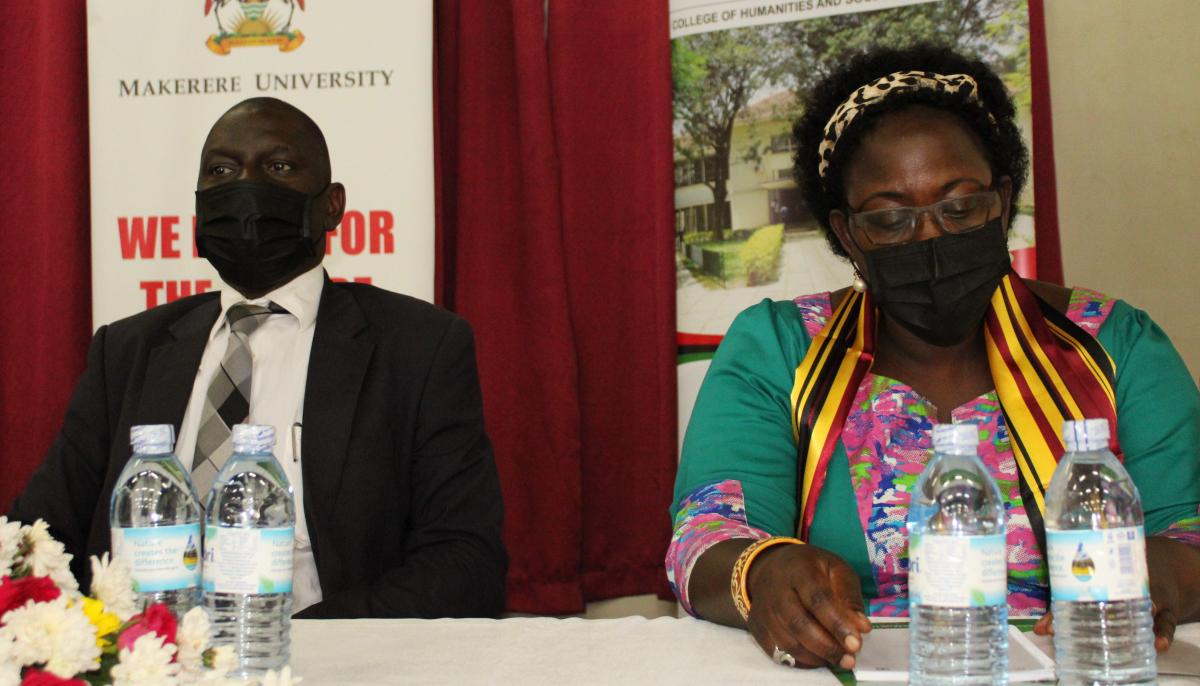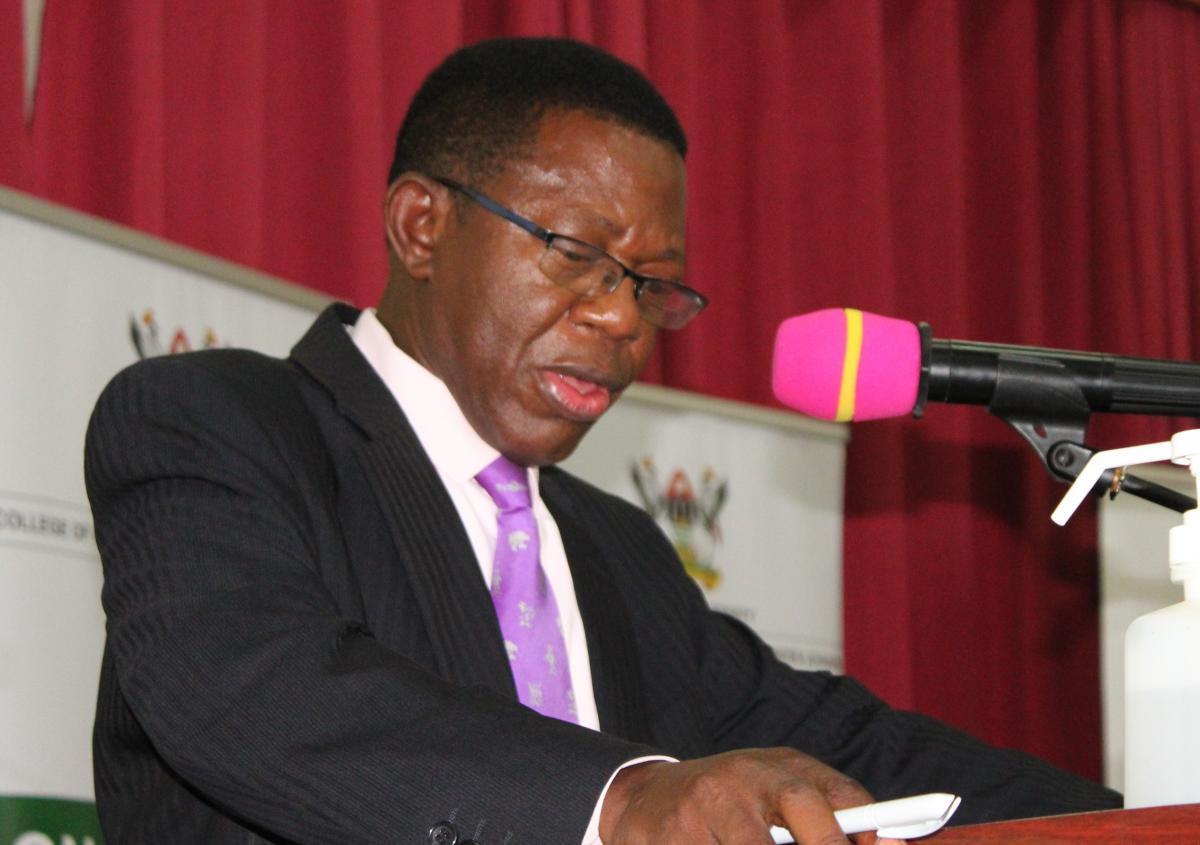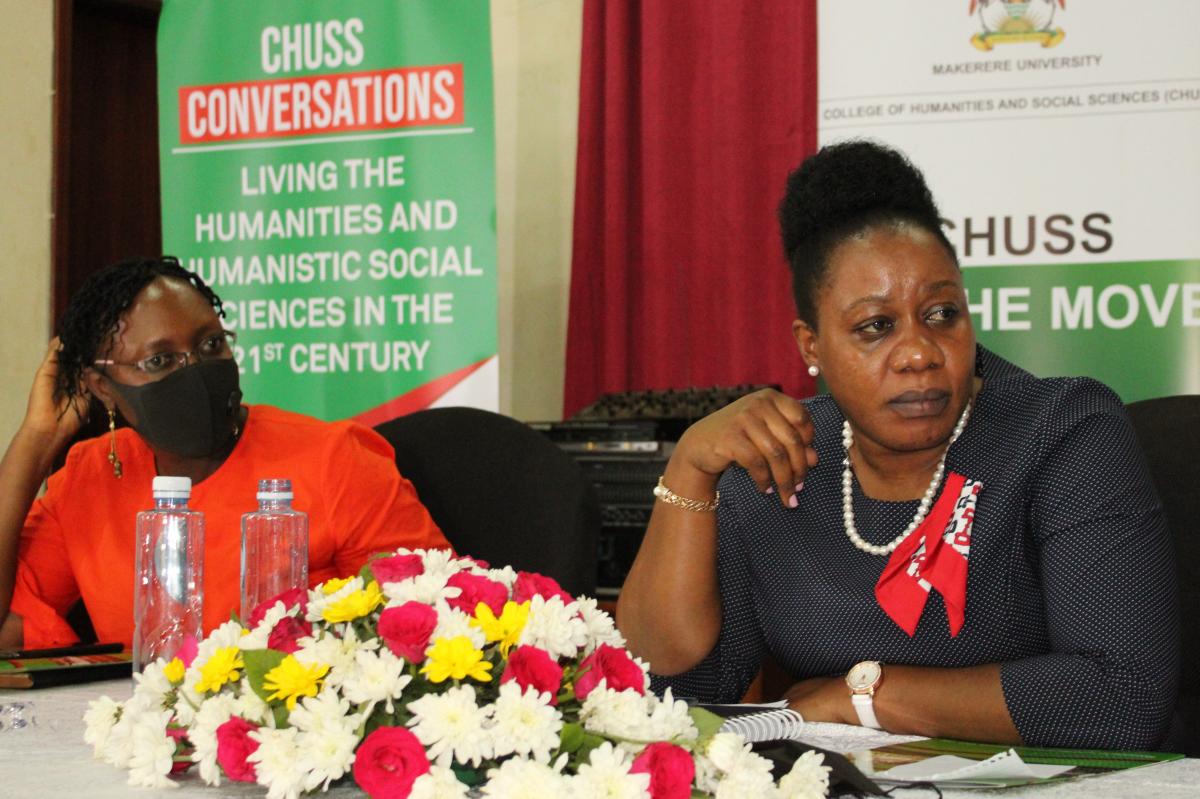
“It is time to forget about the mantra of humanities are not relevant and embrace the mantra of keep humanities front and centre”,
This and many similar statements emerged during the first day of the two-day conversations organized by the College of Humanities and Social Sciences (CHUSS) on the theme, “Living the humanities and humanistic social sciences in the 21st century”.
The conversation was organized on the backdrop of the ongoing debate about the relevancy of humanities and humanistic social sciences where many times the question of relevance always provokes a lot of negativity around the values of the liberal arts education and the wider social sciences.

This conversation was the second and part of the activities funded and organized under the auspices of the Andrew W Melon Foundation project spearheaded by Prof. Josephine Ahikire, who is also, Principal CHUSS.
The conversation held on 9th December,2021 at the CEDAT conference hall, brought together members of the academia from the CHUSS and practitioners including Democratic Party Chairman Hon. Nobert Mao, Ms. Sara Bireete from the Center for Constitutionalism, Ms. Charity Ahimbisibwe from the Citizens Coalition for Electoral Democracy Uganda (CCEDU) s and Prof. Julius Kiiza. CHUSS Early career scholars also presented their works funded under the project.
While opening the conversations, the Director, Directorate of Graduate Research and Training Makerere University Prof. Mukadasi Buyinza said, many colleagues and parents come to him inquiring what peers and children should study at Makerere because of the public acrimony against the humanities and arts.
To him basic science and humanities are playing a complementary role and have a backward and forward role linkage featured. Prof. Buyinza explained that If the STEM, science, engineering, mathematics and biomedical sciences are answering questions to do with the what and how, the humanities are answering why and, are therefore not at conflict with one another.
The Professor warned that whoever engages in the debate that one is better than the other does a de- service on reason that Liberal art is at the heart of humanity but the question is whether academicians in humanities and humanistic social sciences are rightly seeking legitimacy and to reclaim their position.
The number of majors in traditional humanities discipline dwindling
Prof. Buyinza said, whereas humanities and art is about people and society and answering a number of planetary questions that confront humanity, the fear for the future of humanities are warranted.

Buyinza reported that it is evident there is a sharpest drop in the number of majors in traditional disciplines like History, English language, Philosophy etc and are becoming fewer world over even here at Makerere University.
“We need to pause and say, what is happening because of the public discussion on the relevancy and contribution to societal development, many people are now thinking even from primary how to get through the basic sciences.
There has been a general discussion of the irrelevance of the humanities and our duty is to continue asserting our position of our contribution. Whereas we may not show numerically our relevancy, I want to assure you that humanities are influencing all other disciplines. Tell me of any discipline that does not communicate, mathematics, engineering, biomedical sciences do, so, they need the humanities at the same time”,
The Director also said, the new humanities like gender and sexuality increasingly align to social sciences and its methodology hence, the need to emphasize that humanities education is able to cultivate critical thinking, collaboration, problem solving, communication, leadership, diversity, management competencies and empathy to find a niche in the other disciplines in the university.
In addition, Prof. Buyinza stressed the need to think of the next generation of applied and practical humanities that is, the translation humanities such as public policy, history, archival management, remedial studies all providing practical skills to life and therefore rightfully belong to the humanities.
Higher education skewed more towards technical rather than essential skills
In his welcome remarks, the Deputy Principal CHUSS Dr. Julius Kikooma said, the two days’ conversations are aimed at changing the narrative about the humanities and humanistic social sciences.

Dr. Kikooma expressed the need to keep the humanities affront and at the center not least, because todays countries higher education is faced with increasing pressure to prioritize skills and specialized programming.
Kikooma noted that government funding partly dictates this shift towards skill building and also against the backdrop of the growing need for private sector funding and an education consumer increasingly concerned with immediate return on investment.
He also observed that even the private people who are looking for education are looking something that would guarantee them a skill to be able to do something.
Many times such conversation according to Dr. Kikooma are seen as if they cannot be found in humanities and social sciences and this, has pressured the universities and other form of private providers of education who are ending up providing just in-time programs to meet workforce shortages and education access.
“So what we are seeing is programs mushrooming under the pressure of trying to be relevant on what jobs demand today but we know the dynamics of the world of work is more than just getting a skill that helps you solve a problem today.
The nature of the problems that workforce increasingly face is dynamic. If higher education is skewed more towards technical rather than essential skills, we risk building an increasingly divided society where we shall have a much smaller population which will be properly equipped to drive the bigger changes our society needs because technical skills will simply limit us to the challenges of today without steeping solutions in the wider issues.
Over emphasis on skills may solve short term problems but widen equity long term problems. And imagine a society where only a small number of higher education institution end up providing arts or humanities courses because the pressures are in the STEM field”, Dr. Kikooma asserted.
Students prepared only with technical skills require frequent retooling and hit career ceilings quickly- CHUSS Tracer studies
Dr. Kikooma informed participants that the college recently embarked on a program of carrying out a tracer study in all the graduate disciplines to find out how students , are doing, the challenges they are facing and how they are coping, which has given a lot of insights into the dynamics in the world of work.
“And we found that those students who were prepared only with technical skills are the ones who need frequent retooling and end up hitting career ceilings very quickly because they are very limited the way they are prepared to engage challenges they find in the world of work which is unlike the humanities who are prepared in a more holistic way.
When thinking about funding and partnering with higher education, the public, private sector and employers, we need to realize that it doesn’t have to be an either or choice. The choice of having emphasis on technical courses to guarantee technical skill training and liberal arts kind of training are both relevant given the dramatic change we live in today”. He explained.
Dr. Kikooma informed participants that the challenges of COVID-19 have demonstrated that it is no longer possible to focus narrowly on technical preparation alone.
He explained that there is a lot that comes of focusing on humanities broadly, and the liberal arts skills and capacities for instance, the study of Shakespeare can help a literature student to learn to analyze and synthesize trends, develop creative argument backed by solid evidence and navigate ambiguity and therefore, interdisciplinary, team based learning can teach students to solve problems in groups and systems holistically.
He said,the humanities and social sciences have the ability to drive innovation, creativity, thinking and leadership and they have done so in the past and have aspired to create an education eco-system that also acts a s a society leveler.
Conversations part of the interrogation of the challenges that Uganda and Global visions expects of the academia to transform society and solve impacts of COVID 19.
Dr. Kikooma told participants that the conversations are the college ways of saying that they want to be part of the interrogation of the challenges that the Uganda vision, and the global vision are requesting the university to do as academia in trying to promote, transfer and transformation of society to that future which will help solve many problems that the COVID 19 has thrown up in the air.
The humanities and social sciences he said are better placed to provide the critical skills that allow an imagination of a new future.
Kikooma reported that the CHUSS is working on a number of programs that help implement capacity enhancement of staff and students to be ready for that kind of challenge.
“… and today we are seeking to center the humanities and the humanistic social sciences in PhD training. We know that research led mantra is aimed at building a culture of research at the center of all we do and assures that sense of direction.
In addition to graduate training, we have a number of programs aimed at supporting early career academics through post doc training and are here to present the pieces they have undertaken which give good promise to this nation and region about the role and centrality if humanities in forging a new future”, Dr. Kikooma explained.
He also said the college also has a program that focusses on senior researchers to mentor junior academics and engage in transformative research and that will enable a research led endeavor which the university strategic plan calls to.
All these programs according to Dr. Kikooma aim at supporting critical thinking, creativity and adaptability as well as to promote cross disciplinary dialogue, promote issues of social justice as well as the topic of knowledge decolonization.
“It is time to forget about the mantra of humanities are not relevant and embrace the mantra of keep humanities front and centre”- Dr. Julius Kikooma
The Andrew W Melon Foundation and CHUSS
The CHUSS Coordinator, Andrew W Melon Foundation Projects Dr. Edgar Nabutanyi said the college has received funding from the Andrew W Melon Foundation for arts and humanities to the tune of $ 5 million USD for approximately seven years till 2025.
“We are funding researchers and students to study the humanities and the social sciences. The current conversations we are having is to create a platform where the academy meets the practitioners. we are bringing people who practice humanities in terms of leadership democracy, civic society to the academy in a way of exchanging notes and learning from one another”, Dr. Nabutanyi said
Dr. Nabutanyi said the philosophy behind the conversation is that as societies grow and change there is need to exchange views and debate as a market place of ideas on what the researchers found out and and how what has been researched on can help someone doing the political, civic and human rights work.
He said the CHUSS conversation 2021 is the second of the conversation series specifically interested in bringing the academy and practitioners together for another four years.
“We hope that by that time it would have had tractions that it becomes a tradition of Makerere. We are trying to go back to the 1970s 60’s when Mayanja Nkangi were debating with Nkrumah, Nyerere where their conversations started from the Main hall and went in transition which was a journey at that time that shaped the destiny of the three East African countries and we hope that we shall build on that to shape the direction what our country and region is going to take”. Nabutanyi explained.
In 2017, the Andrew W. Mellon Foundation established formal collaboration with Makerere University and committed to support teaching, learning and research activities in the Arts, Humanities and Social Sciences for a period of five years.
Since then, the Foundation has been supporting various learning and research projects in CHUSS, including PhD training and other academic programmes such as USD 1.5 million in support of Makerere Institute of Social Research (MISR)’s research on decolonization; USD 800,000 grant towards the Early Career Scholars Research and USD 800,000 towards Building capacity for research and PhD training. Others are: USD 800,000 grant in support of the ” Historicizing the Humanities at Makerere University Since 1922” College-wide research project; USD 800,000 for the CHUSS Center Excellence in Research Teaching and Learning which was proceeded by a planning grant worth USD 100,000 and the USD 800,000 for Archiving, Memory and Method, recently launched by the minister of State for Higher education, John Chrysostom Muyingo

Practitioners speak out
Sarah Bireete from the Centre for Constitutionalism said:
“There is much more the humanities scholars can do in terms of sharing knowledge, they have a wealth of knowledge, they have a high concentration of brain power, they have time to think. So they can help change the narrative in governance by working towards systematic dissemination of knowledge and empowerment of citizens and that that is the job of universities. Sciences cannot live without arts because, the two are interdependent on each other. Yes, scientists can go in the lab. Even when they discover medicine and there is no communication about that medicine, how will the people know what they have discovered through the labs? Look at the role played by the media in COVID-19, could the scientists play it? Of course not. Media has played a bigger role in preventing COVID more than the scientists”.
The political economy and public policyspecialist Prof. Julius Kiiza said:
The world is interdependent and I disagree with the existing tension that has been created between the natural and humanistic sciences. The world is interrelated and it needs people with innovative ideas, people who practice and translate knowledge into deliverables. There is mutual interdependence of natural and social sciences, the liberal arts and applied sciences”.
Charity Calebo Ahimbisibwe Executive Director Citizen Coalition for Electoral Democracy Uganda (CCEDU) said:
“There is a disconnect between the academicians and the local people. A lot of research has been done by the industry in various aspects e.g. poverty in Uganda. Humanities scholars have the good ideas on how to get rid of poverty from Uganda and Ugandans are suffering out there. How do we get the information on young people to make money from common knowledge on their own,. So until Ugandans know the available opportunities and are able to feed them, we will continue singing poverty, lack of transformation.
Humanities and natural sciences are fluid, they are interconnected. They cannot say that arts are more superior than sciences or vice versa because if you are going to pay scientists more than artists then, you have not recognized the fact that the policy and government organizers are managed by artists.
Artists are the most useful people to contextualize what the scientist is producing. The scientists will go in a test tube put oxygen in, carbon dioxide out and he will keep testing a number of things but the artist thinks about the human being and how he responds to what the scientist has innovated. So the two need each other and there is no such a thing as arts are useless domains of study. They are very useful lawyers, doctors, literature students, journalists”.

President Democratic Party Nobert Mao said;
“Through humanities and social sciences you put the leader in front of society and you make us very uncomfortable. By opening our eyes and shedding light, you give us sites including the eye site to remind us of what is behind us, insights to interpret what is happening but most importantly you give us oversight to be able to around corners, I believe you are very relevant because your knowledge is universal,”
